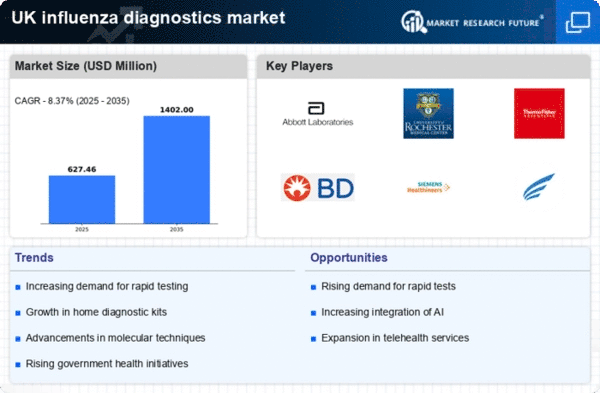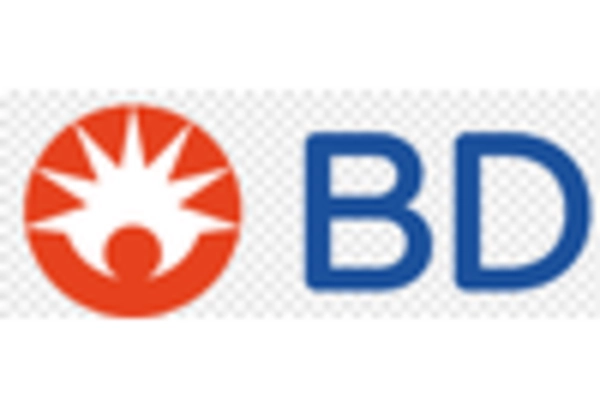Government Funding and Support
Government funding and support for influenza diagnostics are crucial factors influencing the market. The UK government has allocated substantial resources to enhance public health infrastructure, particularly in response to infectious diseases. Recent budgets indicate an increase in funding for research and development in diagnostic technologies, with allocations reaching £50 million for innovative health solutions. This financial backing encourages the development of new diagnostic tools and technologies, fostering growth within the influenza diagnostics market. Furthermore, public health campaigns aimed at increasing awareness and vaccination rates also contribute to the demand for effective diagnostic solutions. As the government prioritizes health security, the support for diagnostic advancements is expected to continue, positively impacting market dynamics.
Rising Incidence of Influenza Cases
The increasing incidence of influenza cases in the UK is a primary driver for the influenza diagnostics market. According to the UK Health Security Agency, seasonal influenza activity has shown a notable rise, with hospital admissions increasing by approximately 30% in recent years. This trend necessitates the development and deployment of effective diagnostic tools to manage outbreaks and ensure timely treatment. The influenza diagnostics market is thus experiencing heightened demand for rapid testing solutions that can accurately identify the virus. Enhanced surveillance and reporting mechanisms are also being implemented to monitor influenza trends, further driving the need for advanced diagnostic technologies. As healthcare providers seek to improve patient outcomes, the focus on accurate and rapid diagnostics is likely to intensify, propelling market growth.
Advancements in Molecular Diagnostics
Advancements in molecular diagnostics are reshaping the landscape of the influenza diagnostics market. Techniques such as polymerase chain reaction (PCR) and next-generation sequencing (NGS) are becoming increasingly prevalent due to their high sensitivity and specificity. These technologies enable the rapid and accurate detection of influenza viruses, which is essential for effective outbreak management. The influenza diagnostics market is witnessing a surge in the adoption of these advanced methodologies, with market analysts projecting a growth rate of 20% for molecular diagnostics in the coming years. This shift towards molecular testing is driven by the need for precise identification of viral strains, which is critical for vaccine formulation and public health responses. As molecular diagnostics continue to evolve, they are likely to play a pivotal role in enhancing influenza detection capabilities.
Growing Demand for Point-of-Care Testing
The shift towards point-of-care testing (POCT) is significantly influencing the influenza diagnostics market. Patients and healthcare providers increasingly prefer rapid testing solutions that can deliver results within minutes, facilitating immediate clinical decisions. The convenience of POCT aligns with the growing emphasis on patient-centric care in the UK healthcare system. Market data suggests that the POCT segment is projected to grow at a CAGR of 15% over the next five years. This trend is driven by the need for timely diagnosis and treatment, particularly in outpatient settings. The influenza diagnostics market is adapting to this demand by developing portable and user-friendly testing devices that can be used in various healthcare environments. As the healthcare landscape evolves, the emphasis on POCT is likely to shape the future of influenza diagnostics.
Increased Awareness of Infectious Diseases
The heightened awareness of infectious diseases among the UK population is a significant driver for the influenza diagnostics market. Public health campaigns and educational initiatives have led to a greater understanding of the importance of early diagnosis and treatment of influenza. This awareness is reflected in increased testing rates, as individuals seek timely medical attention when experiencing flu-like symptoms. The influenza diagnostics market benefits from this trend, as healthcare providers are prompted to invest in more efficient diagnostic tools to meet the rising demand. Additionally, the integration of educational resources into healthcare settings has empowered patients to take proactive measures regarding their health. As awareness continues to grow, the market for influenza diagnostics is expected to expand, driven by the need for accessible and reliable testing solutions.

















